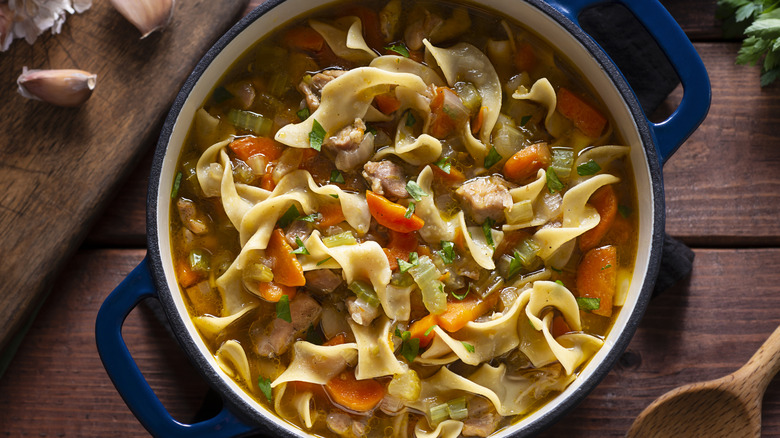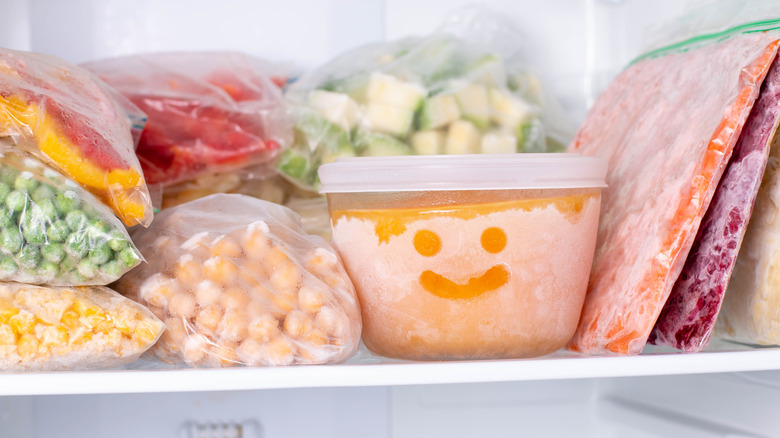How To Properly Freeze Soup To Avoid Ice Crystals
Homemade soup is great for stocking the freezer. It reheats well, can be easily made in bulk, and is perfect to keep around for a quick yet nourishing meal. It's important to store soup carefully, though, to avoid the risk of ice crystallization or freezer burn. These ice crystals can form and degrade the quality of the soup quickly, reducing its storage life and simply making it less delicious.
Proper storage is key to avoiding letting these pesky crystals grow in your soup. The crystals can form when air hits the frozen food, so preventing airflow from hitting the soup itself will deter them from appearing. The best way to do this is to store the soup in something as airtight as possible — gallon freezer bags, sealed tightly and with all of the air squeezed out of them. This works well and also allows you to maximize your freezer space. Vessels like freezer-safe plastic quart containers or tempered glass can work as well, but these can cause their own issues, such as cracking, and are more prone to letting air in.
How freezing affects soup
Ice crystals are the bane of frozen food. These insidious little growths appear and, while they don't affect the safety of the food itself, they can certainly impact the texture and taste. When air and warmth hit the frozen food, moisture leaches out of the dish and crystalizes on top, drying out what's beneath. When it comes to soup, the crystals can melt as the soup reheats, making it watery and affecting the seasoning levels. Freezer burn can also leave veggies feeling a little woody and meats a bit more grainy.
Other issues that frozen soups can encounter are ingredient-based. Take, for example, soup with pasta in it: the pasta will likely degrade in texture due to the freezing and reheating process, taking a perfectly delicious chicken noodle soup and turning it into a mushy mess. This goes for grains and other starches, too. And if your soup has dairy in it, be warned as well: ingredients like heavy cream or milk will turn grainy once heated back up due to separation. Try to avoid freezing soups with these ingredients incorporated in.
More tips for a better frozen soup
Beyond ensuring protection from air, there are plenty more ways to get better results with your frozen soup. One exceedingly important step is to make sure your soup is fully cooled first before freezing it. Ice crystallization can happen extremely quickly if you put hot soup in the freezer, as the warm surface of the food comes into contact with the frigid air inside. The best way to combat this is to allow the soup to chill in the refrigerator before freezing — though don't let it sit in the fridge too long, as the soup is best frozen on the first day it's made.
Labeling your soup is also a great practice. Not only does this ensure you know exactly when the soup was made and frozen, but it helps you keep track of when the soup may be reaching the end of its best-by date. A well-frozen soup will keep its quality for up to 3 months.
Finally, reheating your frozen soup properly makes all the difference in taste. Thawing it in the fridge first will yield the best results; at that point, you can either use the microwave to heat it or simmer it on the stovetop until it's ready to eat.


